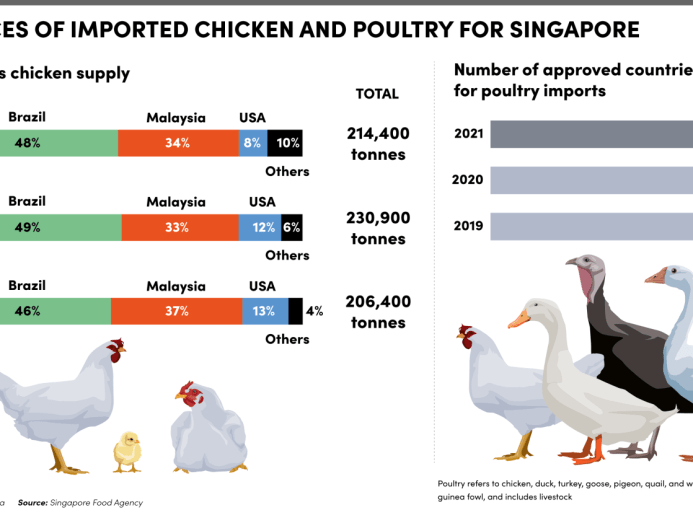Singapore chicken importers say it is difficult to pivot to other sources on short notice as Malaysia curbs exports
SINGAPORE: Chicken importers in Singapore have expressed concerns about pivoting to alternative sources of chilled and frozen chicken following the announcement by the Malaysian government to impose curbs on exports from Jun 1.
Malaysian Prime Minister Ismail Sabri Yaakob on Monday (May 23) announced the decision to halt the export of up to 3.6 million chickens per month from Jun 1 to address the domestic supply shortage.
“The government’s priority is our own people,” Mr Ismail Sabri said in a statement.
The Singapore Food Agency said that about 34 per cent of Singapore’s chicken imports in 2021 were from Malaysia. Almost all of these were imported as live chickens that were slaughtered and chilled in Singapore. Other major sources of chicken include Brazil (49 per cent) and the United States (12 per cent).

In a Facebook post on Monday, SFA said it is closely monitoring the situation on imports from Malaysia and working with stakeholders, such as importers to minimise the impact on chicken supply.
“For example, they will activate their supply chains to increase imports of chilled chicken from alternative sources, increase import of frozen chicken from existing non-Malaysia suppliers, or draw from their stocks of poultry,” SFA said.
However, the secretary of Singapore's Poultry Merchants' Association Ma Chin Chew told CNA that there would be delays even if importers were to immediately place orders with suppliers from other countries, such as USA and Brazil.
“It will be hard to find supplies from other countries at such short notice,” said Mr Ma.
“Even for countries (like the US and Brazil), they are too far. Even if importers make their bookings right away, the chickens will only arrive two months later,” he added.
“To quote a Mandarin saying, water from a faraway place cannot extinguish a nearby fire,” said Mr Ma.
Mr Ma, who is also CEO of Hup Heng Poultry industries, added that he expects business revenue to dip by 60 per cent when Malaysia's export curb is enforced.
Mr James Sim, head of business development for chicken importer Kee Song Food, told CNA that his firm works with mainly farms in Malaysia and “has no intention” of pivoting to sources from other countries.
“The chicken (from places like the USA and Brazil) are frozen options. We deal only with fresh, (chilled) chicken,” he added.
Mr Sim acknowledged that the time frame to pivot now was too short and there is uncertainty as to how long the export ban from Malaysia will last. He added that his firm would work closely with SFA on what to do next.
“We do not know how things will turn out, it might be a short-term thing, it might be a month. As of now, we have not made a decision and will wait for direction from SFA,” he added.
The importers added that the gap in supply from Malaysia could lead to “price increases” for chilled chicken in the short term.
“It is inevitable that when supply drops and demand stays the same, the prices of chilled chicken will go up. It’s simple market forces and can’t be helped,” said Mr Ma.
Kee Song Food’s Mr Sim echoed similar sentiments.
He told CNA that the shortage in chicken from Malaysia is not a new phenomenon, and stocks have been dwindling over the last few months due to the rising costs of chicken feed and other raw materials.
Mr Sim said that Kee Song Food’s supply has fallen by about 20 per cent even before Malaysia's latest move to halt chicken exports, and the company has been forced to adjust prices.
“We initially absorbed the increase in costs but it’s not something sustainable so we were forced to adjust prices a few times,” he added.
“Consumers have to understand this. As a result of the increase in the cost of chicken feed, the cost of production has gone up. If we price chicken at, let's say S$4 per kg, and even with the increase in costs, we still price the same, the more chickens we sell, the more money we lose,” said Mr Sim.
He also noted that chickens supplied from Malaysia recently were smaller in size compared to what was supplied previously. Mr Sim said that due to the shortage, the chickens were “not given ample time to grow”.
“For chicken rice stalls, you need chickens that weigh about 2.4kg to 2.5kg, but recently the supply we received weighed 1.5kg to 1.6kg, a whole kilogram less. We receive complaints (from clients), but they mostly have no choice but to accept the situation,” added Mr Sim.
DFI Retail Group, which operates supermarket chains Giant and Cold Storage, said it is monitoring the situation closely.
"We are currently in discussions with non-Malaysian suppliers to increase imports of chilled poultry, as well as other sources of meat to offer more alternatives for consumers," said a spokesman.
JOHOR CHICKEN FARMERS STOP REARING DUE TO HIGH COSTS
Chicken farmers in Johor who export to Singapore told CNA that the high cost of chicken feed has forced them to halt operations.
Mr S Caleb Rajah, who runs a farm in Kota Tinggi, said the increase in the price of chicken feed, from RM125 (S$39) for a 50kg bag to about RM150 due to inflation, means that he has been unable to make profits from his sales.
He sold about 3,000 chickens before Hari Raya and is now trying to find a way to grow chicken feed himself so that he can start rearing again.
“We can’t cover our costs, and we are losing our money. So I’ve stopped putting chickens on the farm for now,” said Mr Rajah.
Mr Joseph Siu, who operates a chicken farm near Batu Pahat and exports about 200 chickens a day to Singapore, told CNA that he is set to pause operations for now, especially with the announcement to ban exports from Jun 1.
He said that the curb in exports could see his business earnings drop by about 75 per cent.
“It’s a wait-and-see situation. We don’t know how long this export ban will last, but hopefully the market will recover domestically, and we can then resume exports to Singapore,” Mr Siu said.








